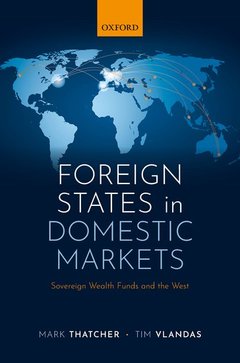Foreign States in Domestic Markets Sovereign Wealth Funds and the West
Langue : Anglais
Auteurs : Thatcher Mark, Vlandas Tim

Political economy debates have focused on the internationalisation of private capital, but foreign states increasingly enter domestic markets as financial investors. How do policy makers in recipient countries react? Do they treat purchases as a threat and impose restrictions or see them as beneficial and welcome them? What are the wider implications for debates about state capacities to govern domestic economies in the face of internationalisation of financial markets? In response, Foreign States in Domestic Markets have developed the concept of 'internationalised statism', where governments welcome the use of foreign state investments to govern their domestic economies. These foreign state investments are applied to the most prominent overseas state investors, Sovereign Wealth Funds (SWFs). Many SWFs are from Asia and the Middle East and their number and size have greatly expanded, reaching $9 trillion by 2020. This book examines policies towards non-Western SWFs buying company shares in four countries: the US, UK, France, and Germany. Although the US has imposed significant legal restrictions, the others have pursued internationalised statism in ways that are surprising given both popular and political economy classifications. This book argues that the policy patterns found are related to domestic politics, notably the preferences and capacities of the political executive and legislature, rather than solely economic needs or national security risks. The phenomenon of internationalised statism underlines that overseas state investment provides policy makers in recipient states with new allies and resources. The study of SWFs shows that internationalisation and liberalisation of financial markets offer national policy makers opportunities to govern their domestic economies.
Mark Thatcher is Professor of Politics, Department of Political Science, Luiss University, Rome. He was previously Professor of Comparative and International Politics, London School of Economics. His research interests lie in comparative public policy and regulation in Europe. His current projects include: the governance of markets, competition and industrial policy in Europe; independent regulatory agencies; cultural heritage protection; and the EU and its political identity. He has published in journals such as Socio-Economic Review, European Journal of Political Research, Journal of European Public Policy, and Comparative European Politics. His books include Resilient Liberalism in Europe's Political Economy (CUP co-edited with Vivien Schmidt, 2013) and Internationalisation and Economic Institutions (OUP, 2007). Dr Tim Vlandas is Associate Professor of Comparative Social Policy, a Fellow of St Antony's College, and associate member of Nuffield College, at the University of Oxford. His research has been published in Comparative Political Studies, Socio-Economic Review, Journal of Common Market Studies, Politics & Society, Journal of European Social Policy, European Political Science, European Journal of Industrial Relation, Social Policy & Administration, European Political Science Review, Political Science Research and Methods, European Political Science Review, Work Employment & Society, and Comparative European Politics. He has been awarded research prizes by the European Network for Social Policy Analysis and the American Political Science Association.
Date de parution : 12-2021
Ouvrage de 192 p.
16.3x24 cm
Thème de Foreign States in Domestic Markets :
© 2024 LAVOISIER S.A.S.



